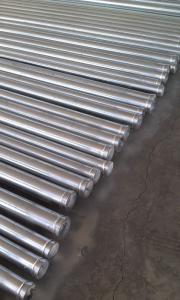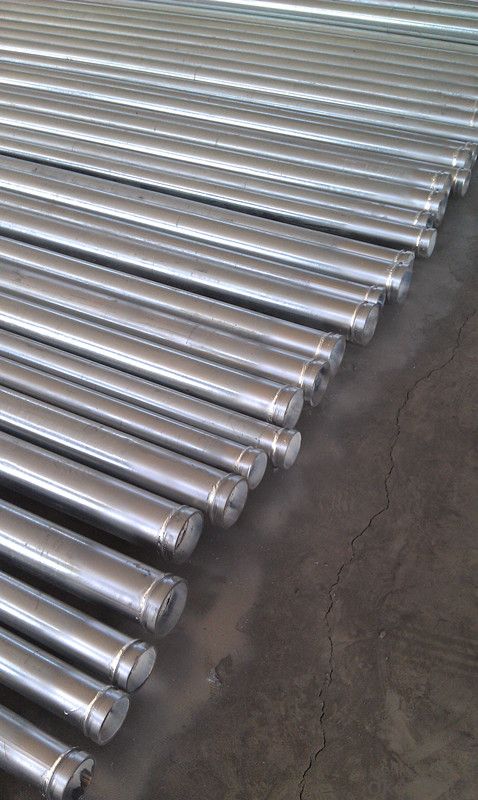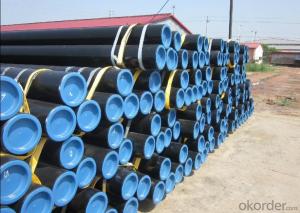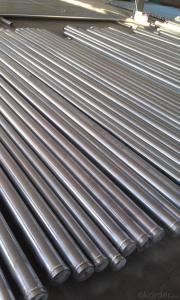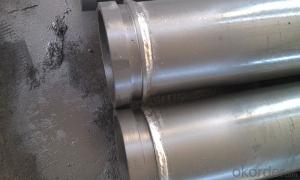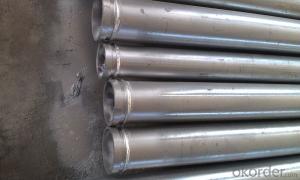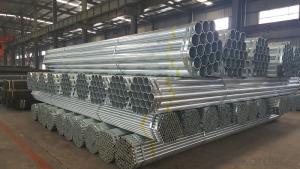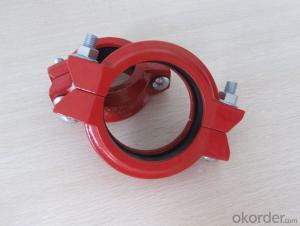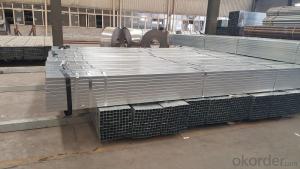Galvanized Victaulic Shouldered grooved Pipe for mining and tunnei
- Loading Port:
- China Main Port
- Payment Terms:
- TT OR LC
- Min Order Qty:
- -
- Supply Capability:
- -
OKorder Service Pledge
OKorder Financial Service
You Might Also Like
Product Name | Shouldered Grooved pipe |
Outside Diameter(mm) | 60.3mm-425mm |
Wall thickness(mm) | 2mm-20mm |
Certification | FM/UL; SGS/BV |
Standard | 1.ASTM A106/A53 GR.A; ASTM A106/A53 GR.B; ASTM A53/A106 GR.C 2.APL 5L GR.B, API 5CT J55, K55, N80 3.ASTM, BS,DIN, EN |
Grade | A, B, C, ST33, ST37, ST35.8, ST45-8, ST45-4, ST52 |
Place of Origin | Hebei Cina |
Face finished | 1.Manual polished 2.mechanical polished 3.black paint on the face 4.Shoulder Grooved on both ends 5.Galvanized or Colour Painting |
Export | Europe, South America, the Middle East, Africa, Asia and other countries and regions, well received by consumers! |
Process Method | 1.Cold Drawn 2.Cold rolled 3.Hot rolled 4. Hot expanded |
Application | Tube with hollow cross-section, a large number of channels for transporting fluids, such as the transportation of oil, natural gas, gas, water and some solid materials, pipes, etc.. |
Package | 1.Inner Packing:Caps at both ends, steel strong trips on every bundle 2.Outer Packing:Standard export package or as per clients' requirements |
- Q: What is the difference between steel pipes and copper-nickel pipes?
- The main difference between steel pipes and copper-nickel pipes lies in their composition and characteristics. Steel pipes are primarily made of iron and carbon, whereas copper-nickel pipes are made of a combination of copper and nickel with trace amounts of other elements. Steel pipes are known for their strength and durability, making them suitable for a wide range of applications, particularly in industries where high pressure and temperature conditions are present. Steel pipes are also relatively cost-effective and have good corrosion resistance, especially when coated or galvanized. On the other hand, copper-nickel pipes are highly resistant to corrosion and have excellent heat transfer properties. They are commonly used in marine environments due to their resistance to saltwater corrosion. Copper-nickel pipes also exhibit antimicrobial properties, making them suitable for applications in healthcare and food processing industries. However, copper-nickel pipes are generally more expensive than steel pipes. In summary, steel pipes are valued for their strength and affordability, while copper-nickel pipes offer superior corrosion resistance and heat transfer properties, but at a higher cost. The choice between the two depends on the specific requirements of the application.
- Q: How are steel pipes used in the power generation industry?
- Steel pipes are extensively used in the power generation industry for various purposes, such as transporting steam, water, and other fluids in power plants. They provide a reliable and durable solution for the high-pressure and high-temperature conditions found in power generation systems. Steel pipes are also used for the construction of boilers, condensers, and heat exchangers, ensuring efficient heat transfer and energy production. Additionally, steel pipes are employed in the exhaust system of power plants to safely and efficiently discharge emissions. Overall, steel pipes play a critical role in the power generation industry by facilitating the transportation of fluids and contributing to the reliable and efficient operation of power plants.
- Q: How do you determine the required wall thickness for steel pipes?
- The required wall thickness for steel pipes is determined through various factors and calculations. One of the primary considerations is the pressure that the pipe will be subjected to. The higher the pressure, the thicker the wall needs to be to ensure the pipe can withstand the internal forces. Another important factor is the material strength of the steel used for the pipe. Different grades of steel have varying tensile strengths, which affect the required wall thickness. The tensile strength is the maximum amount of stress a material can withstand before it fails, so it is crucial to select a steel grade that can handle the expected pressure. Additionally, the pipe's diameter plays a role in determining the required wall thickness. Larger diameter pipes generally require thicker walls to maintain structural integrity and prevent deformation under pressure. To calculate the required wall thickness, engineers use industry standards and formulas. The most commonly used standard is the American Society of Mechanical Engineers (ASME) B31 code, which provides guidelines for designing pressure piping systems. The ASME code incorporates factors such as safety margins, material properties, and pressure ratings to determine the appropriate wall thickness. Furthermore, other considerations such as temperature, corrosion, and external loads may also influence the required wall thickness. For example, high-temperature applications may require thicker walls to prevent the pipe from buckling or becoming too soft. In summary, determining the required wall thickness for steel pipes involves considering factors such as pressure, material strength, diameter, temperature, and other external forces. Engineers rely on industry standards and calculations to ensure the pipe can withstand the intended operating conditions safely.
- Q: What are the different shapes available for steel pipes?
- There are several different shapes available for steel pipes, including round, square, rectangular, and oval.
- Q: What is the difference between seamless steel pipe and welded pipe?
- Such as hydraulic equipment pipeline connection. The weld seam of common steel pipe is its weak link, and the quality of weld is the main factor that affects its overall performance. People who have lived in the north have experienced the experience of freezing pipes and pipes in winter, and the places where they burst are usually welds. Welded pipe is not seamless steel pipe.
- Q: What is the difference between hot-rolled and cold-rolled steel pipes?
- Hot-rolled steel pipes are produced at high temperatures and have a rougher surface finish. They are known for their flexibility and are often used in applications that require bending or shaping. On the other hand, cold-rolled steel pipes are produced at lower temperatures and undergo additional processing to achieve a smoother surface finish. They are generally stronger and more precise in dimensions, making them suitable for applications that require high precision and strength.
- Q: How are steel pipes used in the construction of bridges?
- Steel pipes are commonly used in the construction of bridges as they provide structural support and stability. These pipes are used for various purposes, such as creating the framework, piling, and supporting the bridge's weight. Additionally, steel pipes are often used in the construction of bridge piers and abutments, as well as for drainage systems and utility tunnels. Their high strength and durability make steel pipes essential components in ensuring the safety and longevity of bridge structures.
- Q: How are steel pipes used in the oil and gas pipeline transportation?
- Due to their durability, strength, and resistance to corrosion, steel pipes find extensive use in the oil and gas industry for pipeline transportation. Specifically designed to withstand high pressure and transport various fluids, including crude oil, natural gas, and refined petroleum products, these pipes serve three main purposes in the industry: gathering, transmission, and distribution. Gathering pipelines collect oil and gas from production wells and transport them to processing facilities. Steel pipes are chosen for their ability to endure harsh conditions at extraction sites and effectively transport fluids across long distances. Transmission pipelines, on the other hand, transport oil and gas across vast distances, even spanning countries or continents. Steel pipes are perfect for this task, excelling in handling high pressure and ensuring the efficient flow of fluids over extended distances. To safeguard against external elements and minimize damage risks, these pipes are often buried underground or submerged in water. Distribution pipelines deliver oil and gas to end-users, such as homes, businesses, and industrial facilities. Steel pipes are frequently employed in these pipelines due to their capability to handle varying demand and pressure requirements of different consumers. Though smaller in diameter compared to transmission pipelines, they still provide reliable and safe transportation of oil and gas to their final destinations. Besides their strength and durability, steel pipes used in oil and gas pipeline transportation are coated or lined with different materials to enhance corrosion resistance and reduce the risk of leaks. These protective coatings and linings ensure the pipes' longevity and preserve the integrity of the transported fluids. In summary, steel pipes play a vital role in the oil and gas industry by providing a dependable and efficient means of transporting oil and gas from production sites to processing facilities and ultimately to end-users. Their durability, strength, and resistance to corrosion make them an ideal choice for pipeline transportation in this industry.
- Q: How to distinguish seamless pipe and welded pipe?
- Most of the welded pipe is six meters, the pipe has obvious welding marks, and seamless pipe wall without welding marks
- Q: What is the difference between steel pipes and fiberglass-reinforced pipes?
- The main difference between steel pipes and fiberglass-reinforced pipes lies in their composition and structural properties. Steel pipes are made primarily of iron and carbon, which provide high strength and durability. On the other hand, fiberglass-reinforced pipes consist of a composite material that combines a resin matrix with glass fibers, offering excellent corrosion resistance and high tensile strength. Additionally, steel pipes are heavier and require more maintenance, while fiberglass-reinforced pipes are lighter, easier to install, and have a longer lifespan.
Send your message to us
Galvanized Victaulic Shouldered grooved Pipe for mining and tunnei
- Loading Port:
- China Main Port
- Payment Terms:
- TT OR LC
- Min Order Qty:
- -
- Supply Capability:
- -
OKorder Service Pledge
OKorder Financial Service
Similar products
Hot products
Hot Searches
Related keywords
